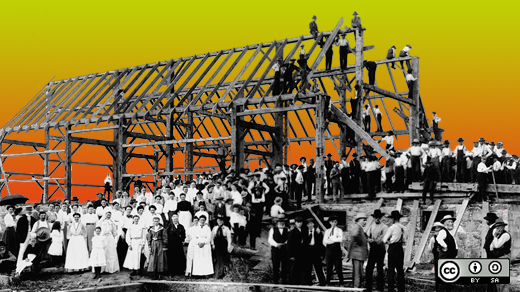Remember the Seinfeld episode where Kramer had the idea to make a coffee table book about coffee tables? I always thought that was a pretty elegant idea. Well, a few months ago, some of the smart folks on Red Hat's community architecture team had a similarly elegant idea:
Write a book about building community the open source way... and write it with a community, the open source way. Meaning, open the text up, allow interested users to contribute, and see what happens.
Brilliant.
The book is entitled The Open Source Way: Creating and nurturing communities of contributors and you can access the current text here and the wiki for contributors here.
I caught up with Karsten Wade, who is leading the project, to learn more.
There have been other books written about community-building over the last few years, but I am not aware of any others that have been written by a community. Where did the idea to start this project come from?
Our team, Community Architecture, has a strategic community role in Red Hat, and part of that is learning, distilling, and sharing knowledge. We bring the knowledge of how to produce software the open source way to different parts of the company. We're all in a community of practice here, and have much to learn from each other.
Once we had the idea of a cookbook or handbook for internal needs, it was immediately clear that following the open source way with the content would be better, have more impact, and protect important knowledge in case our team gets eaten by raptors.
Raptors, huh? Did you design this project to be a handbook for just open source technology projects? Or could anyone make use of it to create and nurture community?
It is definitely aimed for people beyond technology. In fact, I consider that a top target audience. We intentionally left blanks in the book under the examples. Each example illustrates a principle, and if I wrote them, they'd be about Fedora and Linux and yadda yadda yadda.
Two Seinfeld references in one article. Nice.
Thanks. We are inviting participation in picking good examples from outside of technology. And let the stories compete for a spot on the Great Stories to Tell page.
What types of people do you think would make the best contributors for the book?
It would be natural to say anyone, and that is in fact true. But still, there is a reason that most people read Wikipedia, and only a portion participate or contribute fully.
Anyone who likes the material enough to tell other people about it is already participating. Those are the people I'm looking for first,they are the ones on the very periphery of participation, but in making it legitimate, we help grow their expertise.
Which sections do you think offer the best advice as they stand right now? Where do you need more contributor help?
The strongest sections are Communities of practice, How to loosely organize a community, and Stuff everyone knows and forgets anyway.
Yet, within those, there are blank spots that invite participation, and we really need it. Someone new could strengthen even those areas with relative ease.
For someone looking for a bigger challenge, there are three sections that stand out. What your organization does correctly when practicing the open source way and What your organization does wrong when practicing the open source way share a lot of very frank experience from the Red Hat perspective.
I would like to see people from other organizations—of any size—take the chance to anonymize and record their lessons-learned, which may be underpresented or not present in those chapters. This is one way to help make sure they do or don't happen again.
Thanks, Karsten, the book is off to a fantastic start.
People, go check it out. This is a book that needs to be written. By all of you.






6 Comments